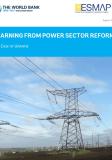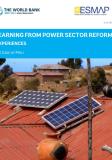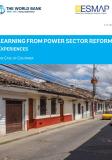Publications
In 2006, the City of Lahore, Pakistan, issued a concession to a private developer to process and compost up to 1,000 tons per day of municipal solid waste (MSW). The project brings composting technology to a country where there are no landfills and common practice is open dumping of MSW.
Composting in a scientifically designed plant improves the local environment by reducing health hazards created by the solid waste collected in open dumpsites and also sequesters the emission of methane (a major greenhouse gas) generated during anaerobic decomposition of biodegradable matter. It lengthens the usable life of the dumping site in a city where land is running out and is at a premium due to the increasing rate of urbanization.
Compost produced from this project will also be a source of revenue and will be used as a soil conditioner/fertilizer for improving the quality of soil in and around Lahore. The project is expected to lead to an estimated emissions reduction of 4.5 million tCO2e during 2008-26. Further, the project offers a promising model for substantially reducing waste disposed of in landfills; reducing environmental and health hazards; recycling valuable materials; providing compost for agriculture; providing employment opportunities; and supporting private sector investment and participation in the provision of such municipal services.
ESMAP. 2010. Good Practices in City Energy Efficiency: Lahore, Pakistan - Solid Waste Composting. ESMAP Energy Efficient Cities Initiative. Washington, DC: World Bank.


